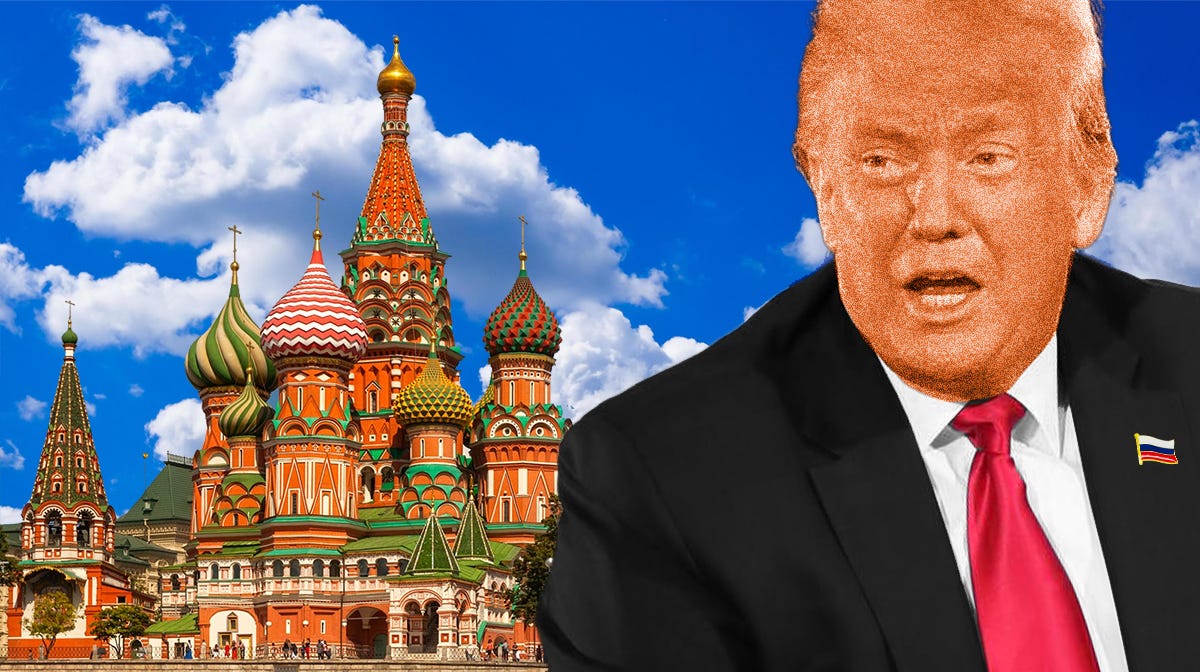The whispers that have long followed Donald Trump—persistent, unsettling murmurs about his relationship with the Kremlin—have broken into a full-throated roar.
In a statement that sent shockwaves through diplomatic circles, Portuguese President Marcelo Rebelo de Sousa recently stated that Trump is "objectively, a Soviet or Russian asset.”
This is not the stuff of fringe conspiracy; it is a stark assessment from a NATO leader, rooted in decades of observed behavior that aligns alarmingly with Russian strategic interests.
While a special counsel Robert Mueller’s investigation during Trump’s first term did not find evidence that he was formally recruited by Russia's security services, it did uncover "extensive criminal activity" by him and his associates.
The question of his role as a Russian asset endures, because to focus solely on recruitment is to misunderstand the subtle art of modern espionage.
When viewed through the lens of intelligence tradecraft, the evidence overwhelmingly suggests that Donald Trump, whether wittingly or not, functions as one of the most effective assets in the history of the Russian Federation.
Support fearless, independent journalism that gets into “good trouble, necessary trouble” by holding power accountable.
The Spy's Lexicon: Understanding the "Asset"
To grapple with this reality, one must first understand the critical distinction between an "agent" and an "asset.”
An agent is a willing spy who has formally signed on with a foreign intelligence agency, is given specific tasks, and is often paid for their services.
An asset, however, is a much broader and more versatile tool. An asset can be anyone who serves a use to a foreign power, from a high-level source to a casual acquaintance.
Crucially, many assets do not even know they are being used. They are sometimes called "dupes" or "useful idiots," whose own motivations—greed, ego, or ideology—can be manipulated to benefit a foreign government without conscious intent to commit treason.
As one former KGB major explained, it is often better to let assets operate in "blissful ignorance.” This provides plausible deniability while achieving strategic goals with minimal risk.
Decades of Cultivation: The Long Game
According to veteran journalist Craig Unger, the narrative of Trump’s cultivation begins over four decades ago.
Unger’s reporting relies heavily on the testimony of his key source, former KGB major Yuri Shvets, who provided a detailed account of how Russian intelligence allegedly targeted Trump.
Per Shvets, the cultivation began in earnest in the 1980s.
The First Contact: The KGB allegedly made its first move after Trump purchased television sets for his Grand Hyatt Hotel from a store that Shvets identifies as a KGB front. A co-owner reportedly acted as a "spotter agent," identifying the ambitious developer as a potential asset.
The 1987 Moscow Trip: This led to Trump's first visit to Moscow in 1987, a trip Shvets claims was orchestrated by the KGB. During this visit, Trump was allegedly "groomed" by officers who found him "extremely vulnerable intellectually and psychologically" and highly "prone to flattery.”
The Payoff: Upon his return, Trump took out a full-page ad in major newspapers assailing America's alliance with NATO. Shvets recalled that a cable arrived at KGB headquarters celebrating the ad as a successful "active measure" executed by their new asset.
A Trail of Compromise: Money, Motive, and the Mafia
An intelligence asset can be cultivated through ego, but they can also be controlled through financial leverage. After a series of bankruptcies, Trump’s access to traditional lending dried up, creating a need for capital that Russian sources were seemingly eager to provide.
In a candid moment in 2013, Eric Trump reportedly revealed the family’s financial strategy to golf writer James Dodson.
When Dodson asked who was funding their golf course acquisitions during the post-recession credit crunch, Eric replied, "Well, we don't rely on American banks. We have all the funding we need out of Russia".
This reliance was echoed by Donald Trump Jr., who stated at a 2008 real estate conference that "Russians make up a pretty disproportionate cross-section of a lot of our assets.”
Perhaps the most glaring example of this is the 2008 sale of a Palm Beach mansion, "Maison de l'Amitié,” to Russian billionaire Dmitry Rybolovlev for $95 million—a property Trump had purchased for just $41 million a few years earlier.
The massively inflated price for a house Rybolovlev never lived in and planned to demolish has been widely viewed as a suspicious influx of Russian cash at a time Trump needed it most.
This was not an isolated financial dealing with questionable Russian figures. According to journalist Craig Unger, Trump’s properties have a long history of association with Russian organized crime.
In 1984, a man named David Bogatin, identified in FBI files as a member of the Russian mafia, bought five condos in Trump Tower for $6 million.
Unger reports this was the beginning of a pattern, claiming to have found 13 individuals with ties to the Russian mafia who lived in or owned property in Trump buildings, suggesting Trump was "hosting the Russian mafia for many years before he even ran for president.”
These long-standing financial entanglements created clear avenues for potential compromise.
An Asset in the White House: The Objective Results
Whether one believes the detailed accounts of his cultivation or the implications of his financial dealings, Trump's actions in office align perfectly with the goals of an asset.
As Edward Lucas of the Center for European Policy Analysis writes, "Regardless of why, he's acting exactly like a Russian asset would.” The results speak for themselves:
Undermining Alliances: Trump has consistently worked to divide the United States from its allies, disparaged the leaders of the closest partner nations, and promoted their far-right, anti-American rivals.
Siding with Putin: At the 2018 Helsinki summit, Trump famously stood next to Vladimir Putin and sided with the Russian dictator over America's own intelligence agencies.
Abandoning Ukraine: He has tipped the scales in Russia's favor by cutting off aid and intelligence support to Ukraine and publicly berating President Volodymyr Zelensky.
His behavior is so consistently beneficial to Moscow that Portuguese President Rebelo de Sousa stated that Trump's leadership "has strategically favored the Russian Federation.”
The Simplest Explanation
The principle of Occam's razor suggests that the simplest explanation is often the correct one.
The labyrinth of justifications for Trump's behavior—his personality, his isolationism—are far more complex than the single, unifying theory that he was compromised decades ago and continues to act in the interest of a foreign adversary.
His chaotic, petulant mindset makes him an ideal unwitting asset—one whose own narcissism and greed drive him to do exactly what the Kremlin desires.
Whether he is a witting accomplice, a "useful idiot," or simply a transactional businessman whose goals align with Moscow's, the outcome is identical. His actions have undone decades of work building American power and handed strategic victories to Vladimir Putin.
In the high-stakes game of geopolitics, intentions are secondary to results. And the results are clear: Donald Trump functions as a Russian asset, unwittingly or otherwise.
This platform is powered by its readers. While all subscriptions help this space thrive, paid support is what keeps this work independent and ensures every article remains free for all.
Sources:







